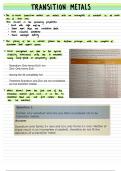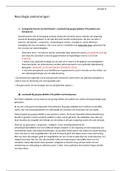Summary
Summary A-Level/ Advanced Higher Chemistry - Transition Metals
- Institution
- AQA
A-Level/ Advanced Higher Chemistry course notes. Concise notes covering transition metals. Notes include a clear and easy to follow summary of the topic, highlighted key-points, and supporting examples where appropriate.
[Show more]




